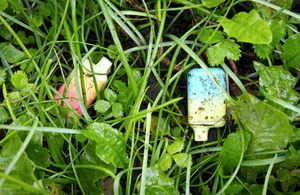Government crackdown on single-use vapes
Ban on sale and supply of single-use vapes in England to come into force on 1 June 2025

Single-use vapes in a green space
New legislation to ban the sale of single-use vapes from 1 June 2025 has been laid in Parliament, Circular Economy Minister Mary Creagh confirmed today.
Single-use vapes are not rechargeable or refillable, and are typically discarded as general waste in a bin or littered, rather than recycled – contributing to a flood of litter on our streets. Even when they are sent to recycling facilities, they usually have to be disassembled by hand – a slow and difficult process which will struggle to keep up with the pace of vape production. Their lithium-ion batteries can also present a fire risk to waste industry workers.
Last year, Materials Focus estimated that almost five million single-use vapes were either littered or thrown away in general waste every week in the UK, almost four times as much as the previous year and the equivalent of eight being thrown away per second. In 2022, they found more than 40 tonnes of lithium from single-use vapes was discarded, which is the same amount used to power 5,000 electric vehicles.
Making the sale of single-use vapes illegal, delivers on the Government’s commitment to act on this important issue, and kick-starts the push towards a circular economy and helps to curb the rise of young people taking up vaping, while also protecting our natural environment and town streets from a tide of litter.
Vape usage in England grew by more than 400% between 2012 and 2023, with 9.1% of the British public now buying and using these products. The long-term health impacts of vaping are unknown, and the nicotine contained within them can be highly addictive, with withdrawal sometimes causing anxiety, trouble concentrating and headaches.
Circular Economy Minister Mary Creagh said:
Single-use vapes are extremely wasteful and blight our towns and cities.
That is why we are banning single use vapes as we end this nation’s throwaway culture.
This is the first step on the road to a circular economy, where we use resources for longer, reduce waste, accelerate the path to net-zero and create thousands of jobs across the country.
Minister for Public Health and Prevention, Andrew Gwynne, said:
It’s deeply worrying that a quarter of 11-15-year-olds used a vape last year and we know disposables are the product of choice for the majority of kids vaping today.
Banning disposable vapes will not only protect the environment, but importantly reduce the appeal of vapes to children and keep them out of the hands of vulnerable young people.
The government will also introduce the Tobacco and Vapes Bill – the biggest public health intervention in a generation – which will protect young people from becoming hooked on nicotine and pave the way for a smoke-free UK.
The public is in favour of restricting the sale and supply of single-use vapes, with 69% of consultation respondents supporting these proposals in February 2024.
Banning these vapes will stop them from being thrown into bins with general waste, where they typically end up in landfill or being incinerated, posing a fire risk due to their lithium-ion batteries and can cause poor air quality. Furthermore, it will stop plastic, lead, and mercury from leaching into the environment, which can cause waterways to be contaminated and poison our wildlife.
The Government has laid legislation to introduce the ban and, subject to parliamentary approval, businesses will have until 1 June 2025 to sell any remaining stock they hold and prepare for the ban coming into force. The UK Government and Devolved Governments have worked closely and will align coming into force dates.
Libby Peake, head of resources at Green Alliance, said:
Disposable vapes are the last thing our children and the planet need, and for too long the market for them has been allowed to grow unchecked. Every single one wastes resources that are critical to a more sustainable economy – like lithium, needed for the batteries that power electric cars.
When they’re littered, the nicotine, plastic and batteries they contain are all extremely harmful. Even when they’re put in a bin, their batteries can catch fire. The government is right to ban these harmful devices - it’s a welcome step in the journey towards an economy where waste is reduced by design.
Climate activist and environmental scientist, Less Waste Laura said:
Disposable vapes exploded on to the market, becoming perhaps the first mainstream disposable electronic device to litter our streets, and reflecting the relentless evolution of the tobacco industry.
The UK Government’s action to ban these single-use products in 2025 is a welcome, and crucial, step. The ban isn’t just about cutting littered vapes; it challenges the broader rise in disposable technology driving a concerning larger increase in electronic waste, with its associated fire risk, and use of scarce materials.
I welcome the ban from a health angle too, and see it as crucial to breaking the grip of vaping on our youth, alongside challenging the throwaway culture threatening to suffocate our planet.
Recent government figures show that recycling rates for waste from households has fallen to 44.1% in 2022.
This ban is part of the government’s commitment to end the nation’s throwaway culture and stop the avalanche of rubbish that is filling up our high streets, countryside and oceans.
The Environment Secretary has made it one of his five core priorities to move to a future where we keep our resources in use for longer, accelerate the path to net zero and increase investment in critical infrastructure and green jobs.
Please see here for further information on the environmental cost of single-use vapes.